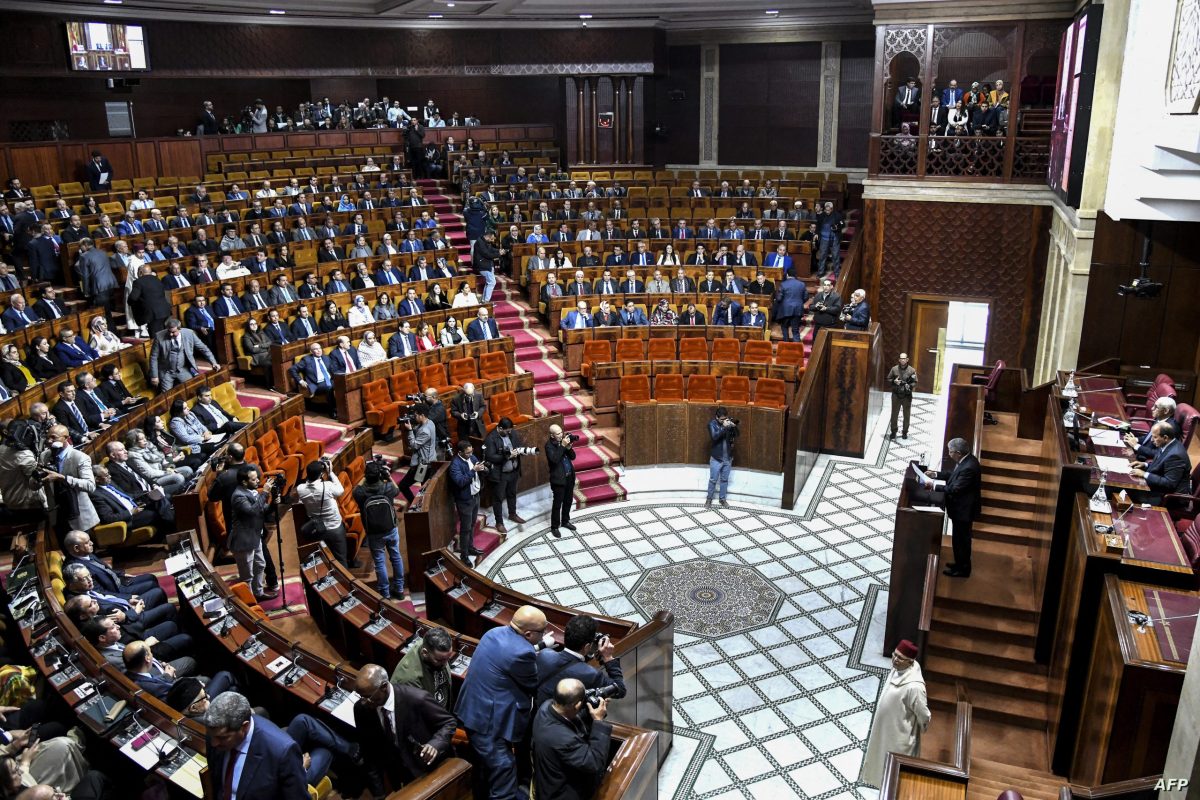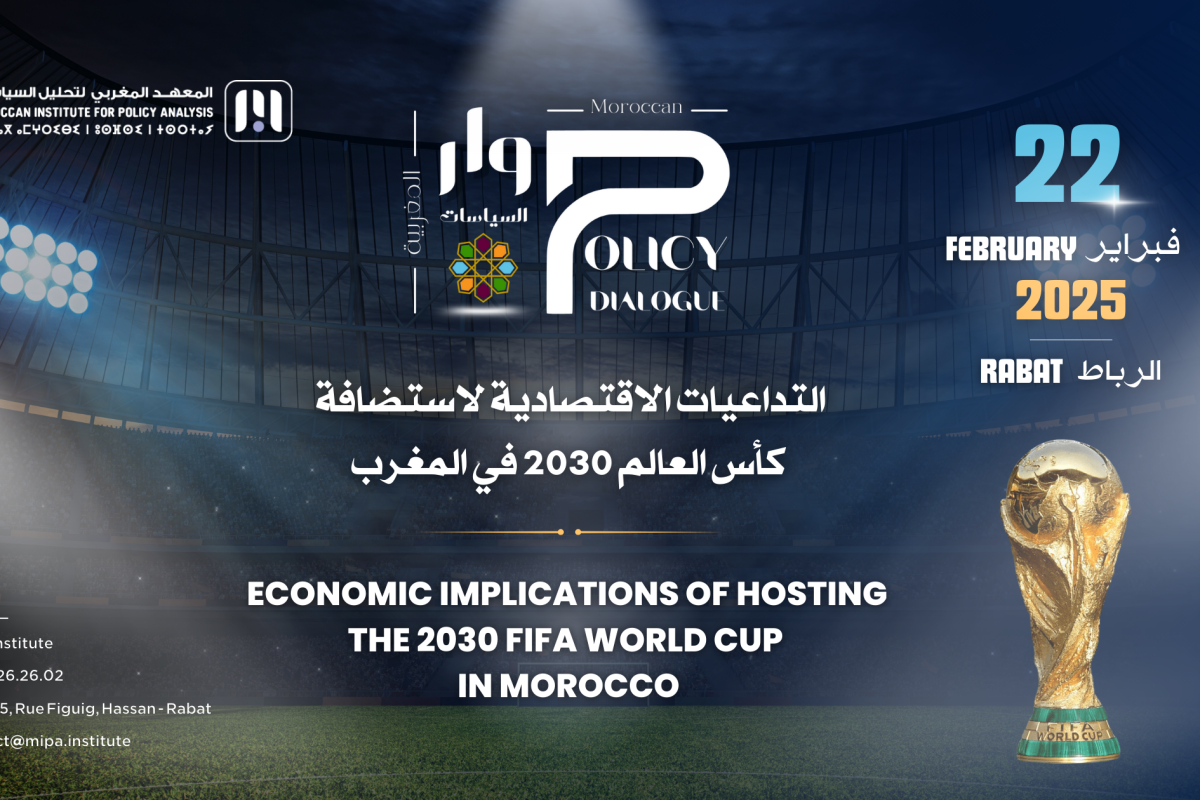[vc_row][vc_column][vc_column_text]
Morocco’s demarcation of its maritime borders is linked to legal, political and geostrategic considerations, mainly with regards to the precious resources at sea
Download article
INTRODUCTION
On February 4th, 2019, the House of Counselors[i] unanimously passed two bills[ii] in the presence of the Minister of Foreign Affairs and Cooperation. These draft laws seek to extend Morocco’s legal authority over its maritime domain running from Tangiers in the north to Lagouira in the south. This move marks an important shift in Morocco’s policy in managing its maritime areas. The new legislation defines its maritime borders to include the waters and the continental shelf of the Sahara, thus completing Morocco’s legislative ratification procedure in this regard.[iii]
It should be noted that this new legislation was overdue as Morocco had been putting off the delineation of its maritime borders for years. Morocco ratified the United Nations Convention on the Law of the Sea in 2007, nearly thirteen years after it had entered into force in 1994[iv]. It equally stalled the drafting of the required legislative texts for nearly ten years. It was not until July 6th, 2017 that the Government Council approved the two draft laws[v] and forwarded them to the Speaker of the house of Representatives on July 26th of the same year. The Speaker referred them to the Foreign Affairs Committee on August 2nd, 2017. Two years had passed before the two bills were tabled for discussion in December 2019. Despite the delays in managing this issue, the enactment process of the two bills was swift, with the House of Counselors’ Foreign Affairs, Borders, National Defense and Occupied Territories Committee and plenary session completing all readings in one day.
Despite what appears at first glance to be a sovereign decision[vi], that is part of Morocco’s keenness to protect its interests and ensure respect for its sovereignty over its national lands and waters, yet, an in-depth look at the decision to demarcate the maritime borders lays bare other geopolitical dimensions in the western Mediterranean and in the Atlantic[vii]. The move is mainly attributed to potentially abundant natural resources.
Throughout this paper, we will attempt to explain the reasons that led Morocco to enact the legislation delineating its maritime borders.
UNCOVERING THE REASONS BEHIND WAITING
Several countries ratified the United Nations Convention on the Law of the Sea on December 10th 1982. It entered into force on November 14th, 1994. As stated in its preamble, the Convention sought to respond to “developments since the United Nations Conferences on the Law of the Sea held at Geneva in 1958 and 1960 have accentuated the need for a new and generally acceptable convention on the law of the sea[viii]”. Article 3 of the Convention stipulates that “every state has the right to establish the breadth of its territorial sea up to a limit not exceeding 12 nautical miles, measured from baselines determined in accordance with this Convention[ix].”
However, Morocco did not ratify this agreement, which is regarded as the “constitution of the oceans[x]”, until 2007, after examination of the issue by a technical committee instituted in 2003. Morocco justified this delay in accession by saying that it was working on the settlement plan proposed by the United Nations. This included the deployment of the MINURSO mission in 1991 in the Sahara with the aim of organizing a referendum to determine the fate of the local population. It went on to say that it did not want to take any move that could be used to undermine the credibility of its position on the international settlement plan[xi].
The main motives behind Morocco’s ratification of the convention are political in nature. On the one hand, there were signs that the United Nations had given up on the first settlement plan stipulating the organization of a referendum in the Sahara and moved to look for a political solution. In the meantime, Morocco put forward, in 2007, its autonomy proposal, which the United States described as “serious, realistic and credible”[xii].
On the other hand, Morocco needed to complete its legislation corpus in this field, in order for it to keep pace with Spain. The latter had long harmonized its legislative texts with the Convention on the Law of the Sea and had twice filed relevant papers on this matter with the competent United Nations commission. In contrast, Morocco settled for submitting an objection twice: the first in 2009, when Madrid demanded the formation of the continental shelf, and the second in December 2004 when it requested that the same commission extend its continental shelf off the Canary Islands by more miles. Both files were put on hold. When Spain deposited its file on maritime border demarcation before the competent UN commission after its ratification of the Convention in 1999, Morocco was compelled to become a signatory to the convention in order to have the legitimacy to object to Madrid’s move.
However, Morocco did not make headway into updating its national legislation in order to respond to the requirements of the United Nations Convention on the Law of the Sea; nor did it engage in the next step until January 2013. Only then was a ministerial committee established within the Ministry of Foreign Affairs. The committee included all concerned governmental departments. The committee was entrusted with carrying out technical studies in preparation for completing the legislative texts. The committee did not complete its work until 2017, the date marking the end of the ten-year deadline of ratifying the Convention[xiii]. As such, the government ratified the legal texts, particularly Bill No.37.17, which extends Morocco’s legal authority over the maritime domain along the Moroccan Sahara coastal line, as well as Bill No.38.17 establishing a 200-nautical-mile exclusive economic zone off Moroccan shores.
The government’s enactment of the two draft laws did not follow any practical measures until November 6th, 2019, when King Mohammed VI, on the forty-fourth anniversary of the Green March, stressed the need to invest in the entire territories of the Kingdom. In his speech, he said, “The Green March has enabled Morocco to regain its southern provinces. The map of Morocco has changed since then. We have not realized that Rabat is now in the far north and Agadir is truly at the center of the country ”[xiv]. It seems that this speech pointed to speedy legislation to avoid the legislative vacuum that characterizes national legislation on maritime areas and harmonizes Morocco’s domestic sovereignty over all its land and waters from Tangiers to Lagouira.
GEOSTRATEGIC MOTIVES
In addition to political factors, there is a geopolitical factor that helps understand Morocco’s decision to demarcate its maritime borders. This relates to the stalemate characterizing the Sahara conflict in recent years. The UN efforts, namely the two round tables held in Geneva, Switzerland in September 2018 and March 2019, at the invitation of former Secretary-General’s UN Envoy to the Sahara, Horst Köhler, failed to move stagnant waters][xv].
Besides, the entry into force of both the Fisheries Partnership Agreement[xvi] and the EU-Morocco Association Agreement[xvii] in 2019 encouraged Morocco to take a step forward in demarcating its maritime borders. Both agreements include agricultural products and fisheries originating from the marine areas along the coastal line of the Saharan regions.
Another untold yet important reason underlying this decision is the open race between Spain and Morocco to control seabed mineral resources, especially the precious Tropic Seamount[xviii]. This seamount is 1,000 meters Below sea level, south of the Canary Islands and off the coast of the southern provinces of the Kingdom. It has been discovered by a joint Spanish scientific mission in the past decade. Although it is located outside the exclusive economic zone of Spain and Morocco, it is closer geographically to Morocco. It is 250 nautical miles (475 km) away from the southwest of the Canary Islands and 241 nautical miles (458 km) off the coast of Morocco. It is a strategic target for both Rabat and Madrid due to its mineral wealth[xix]. Results of a study conducted by the British-Spanish mission in 2016 concluded that the seamount may contain enough cobalt to make batteries for 277 million electric cars, as well as a large amount of tellurium, which is an element used in solar panels[xx].
CONCLUSION: CHALLENGES AFTER ENACTING “MARITIME DELIMITATION” LEGISLATION?
Morocco seems to have consolidated its resolve to demarcate its maritime borders by unanimously passing two bills in parliament. Despite this, two new challenges loom large:
The first challenge concerns Rabat’s preparation of a comprehensive file for submission to the United Nations Commission on Sea Sovereignty Disputes and Maritime Boundary Delimitation. Add to this the ensuing battle of political and legal advocacy within this commission. This advocacy may evoke for the Spanish, Moroccans and others the discussions that took place at the International Justice Court in The Hague in 1975 at the beginning of Morocco’s endeavor to end the Spanish colonization of the Sahara during the latter half of General Franco’s rule. It is likely that this milestone will have an indirect effect on MINURSO officials, who will attempt to avoid any new skirmishes or disputes over the areas in which fishing is not permitted. Also at stake is the commitment of the Spanish and other ships to respecting Morocco’s new national waters.
The second challenge is the way Morocco will deal with Spain, which controls seven enclaves along the Moroccan coast, including the occupied coasts of Ceuta and Melilla. Despite the conciliatory tone[xxi] of the Spanish officials regarding “Morocco’s right to demarcate its maritime borders”[xxii], it is unlikely that easy consensus could be reached on all issues related to maritime borders. This could favor the scenario of a tug of war between Rabat and Madrid.
Endnotes
[i] This is the upper chamber of the Moroccan Parliament
[ii] Bill No.37.17 amending and completing Dahir-act No.1.73.211 on territorial sea promulgated on March 2, 1973 (Muharram 26 1393) and Bill No.38.17 amending and completing Act No.1.81 establishing an exclusive economic zone extending 200 nautical miles from Moroccan shores.
[iii] Elaph (electronic newspaper), مجلس المستشارين المغربي يصادق على ترسيم الحدود البحرية (Moroccan House of Councilors approves the demarcation of the maritime border), February 4, 2020 accessible at: https://elaph.com/Web/News/2020/02/1280862.html
[iv] Tullio Trevis, United Nations Convention on the Law of the Sea, United Nations Audiovisual Library of International Law, 2010, p .: 1, accessible at https://legal.un.org/avl/pdf/ha/uncls/uncls_a.pdf
[v] المغرب يؤمن مجاله البحري في الصحراء، (Morocco Secures its Maritime Domain in the Sahara), Al-Sabah newspaper, July 10, 2017, accessible at: https://assabah.ma/228824.html
[vi] المغرب: ترسيم الحدود البحري قرار سيادي خاص (Morocco: Maritime Border Demarcation is a Special Sovereign Decision), the Turky Anadolu News Agency, December 26, 2019, accessible at: https://www.aa.com.tr/ar/%D8%A7%D9%84%D8%AF%D9%88%D9%84-%D8%A7%D9%84%D8%B9%D8% B1% D8% A8% D9% 8A% D8% A9 /% D8% A7% D9% 84% D9% 85% D8% BA% D8% B1% D8% A8-% D8% AA% D8% B1% D8% B3% D9% 8A% D9% 85-% D8% A7% D9% 84% D8% AD% D8% AF% D9% 88% D8% AF-% D8% A7% D9% 84% D8% A8% D8% AD% D8% B1% D9% 8A% D8% A9-% D9% 82% D8% B1% D8% A7% D8% B1-% D8% B3% D9% 8A% D8% A7% D8% AF% D9% 8A-% D8% AE% D8% A7% D8% B5 / 1684866
[vii] Mohamed Karim Boukhsas, خبايا استيقاظ المغرب لترسيم حدوده بعد عقود من الاستقلال (The Untold Reasons Behind Morocco’s Wake-up Move to Demarcate Its Borders After Decades of Independence), Al-Ayyam Weekly, Issue 880, January 9, 2020.
[viii] عيسى دباح، موسوعة القانون الدولي: أهم الاتفاقيات والقرارات والبيانات والوثائق الدولية للقرن العشرين في مجال القانون الدولي العام، المجلد الثاني، دار الشروق الأردنية للنشر والتوزيع (Issa Dabbah, Encyclopedia of International Law: The Most Important International Agreements, Decisions, Statements and Documents of the Twentieth Century in the Field of Public International Law, Volume 2), 2003, p .: 160.
[ix] IBID
[x] Tullio Trevis, United Nations Convention on the Law of the Sea, United Nations Audiovisual Library of International Law, 2010, p.1, accessible at: https://legal.un.org/avl/pdf/ha/uncls/uncls_a.pdf
[xi] حوار مع مصطفى الخلفي، الأسباب الحقيقية لترسيم الحدود البحرية (Interview with Mustafa El Khalfi: The real reasons for demarcating the maritime borders), Al-Ayyam Weekly, Issue 883, January 30, 2020.
[xii] واشنطن تجدد دعمها للمقترح المغربي للحكم الذاتي بالصحراء (Washington renews its support for the Moroccan proposal for autonomy in the Sahara), Bayane Al-Yaoume, December 19, 2011, accessible at: http://bayanealyaoume.press.ma/l-r-1206/.html
[xiii] Article 4 of Annex II on the Commission on the Limits of the Continental Shelf, United Nations Convention on the Law of the Sea (p.173) states that “Where a coastal State intends to establish the outer limits of its continental shelf beyond 200 nautical miles, it shall submit particulars of such limits to the Commission … as soon as possible but in any case within 10 years of the entry into force of this Convention for that State”.
[xiv] The text of the royal speech, Moroccan Sahara website, November 6, 2019, accessible at: http://www.sahara.gov.ma/ar/messages-royaux/%D8%AC%D9%84%D8%A7%D9%84%D8%A9-%D8%A7%D9%84%D9% 85% D9% 84% D9% 83-% D9% 8A% D9% 88% D8% AC% D9% 87-% D8% AE% D8% B7% D8% A7% D8% A8% D8% A7-% D8 % B3% D8% A7% D9% 85% D9% 8A% D8% A7-% D8% A5% D9% 84% D9% 89-% D8% A7% D9% 84% D8% A3% D9% 85% D8 % A9-2 /
[xv] – لقاء جنيف الثاني حول إقليم الصحراء: هل يثمر جديدا؟ (Will The Second Geneva Meeting on the Sahara Region Bear New Fruits?), Turkey Anadolyu News Agency, March 21, 2019, accessible at: https://www.aa.com.tr/ar/%D8%A3%D8%AE%D8%A8%D8%A7%D8%B1-%D8%AA%D8%AD%D9%84%D9% 8A% D9% 84% D9% 8A% D8% A9 /% D9% 84% D9% 82% D8% A7% D8% A1-% D8% AC% D9% 86% D9% 8A% D9% 81-% D8 % A7% D9% 84% D8% AB% D8% A7% D9% 86% D9% 8A-% D8% AD% D9% 88% D9% 84-% D8% A7% D9% 82% D9% 84% D9 % 8A% D9% 85-% D8% A7% D9% 84% D8% B5% D8% AD% D8% B1% D8% A7% D8% A1-% D9% 87% D9% 84-% D9% 8A% D8% AB% D9% 85% D8% B1-% D8% AC% D8% AF% D9% 8A% D8% AF% D8% A7-% D8% AA% D8% AD% D9% 84% D9% 8A% D9% 84/1424399
[xvi] Morocco Renews the Fisheries Agreement with Europe, includes the Sahara, Sky News Arabia, January 15, 2019, accessible at: https://www.skynewsarabia.com/business/1217809-%D8%A7%D9%84%D9%85%D8%BA%D8%B1%D8%A8-%D9%8A%D8%AC%D8% AF% D8% AF-% D8% A7% D8% AA% D9% 81% D8% A7% D9% 82-% D8% A7% D9% 84% D8% B5% D9% 8A% D8% AF-% D8 % A7% D9% 84% D8% A8% D8% AD% D8% B1% D9% 8A-% D8% A7% D9% 94% D9% 88% D8% B1% D9% 88% D8% A8% D8% A7-% D8% A7% D9% 95% D8% AF% D8% B1% D8% A7% D8% AC-% D8% A7% D9% 84% D8% B5% D8% AD% D8% B1% D8% A7% D8% A1
[xvii] Chloe Tiffin, European-Moroccan Relations: A Win-Win Partnership, the Moroccan Institute for Policy Analysis.
[xviii] جبل تروبيك. كلمة السر في “فزع” إسبانيا بعد إقرار المغرب لحدوده البحرية (Mount Tropic: The Word Triggering “Panic” in Spain after Morocco’s Recognition of its Maritime Borders), Assahifa, January 23, 2020.
[xix] حوار مع الحسين المجدوبي، القضية ذات طابع جيو سياسي مرتبطة بالمعادن النفيسة (Interview with Hussein Majdoubi: The Issue is Geopolitical as it Relates to Rare Earth Metals, Al-Ayyam, Issue 880, January 9, 2020.
[xx] James Badcock, Spain rejects Morocco’s claim on mineral-rich undersea volcano, Telegraph, 23 January 2020, accessible at: https://www.telegraph.co.uk/news/2020/01/23/spain-rejects-moroccos-claim -mineral-rich-undersea-volcano /
[xxi] الرسالة التصالحية التي أطلقتها الرباط وزيرة الخارجية الإسبانية من الرباط لم تطمئن مدريد وجزر الكناري (The Conciliatory Message Launched by the Spanish Minister of Foreign Affairs from Rabat did not Reassure Madrid and the Canary Islands), Al-Quds Al-Arabi, January 26, 2020 accessible at: https://www.alquds.co.uk/%D8%A7%D9%84%D8%B1%D8%B3%D8%A7%D9%84%D8%A9-%D8%A7%D9%84% D8% AA% D8% B5% D8% A7% D9% 84% D8% AD% D9% 8A% D8% A9-% D8% A7% D9% 84% D8% AA% D9% 8A-% D8% A3% D8% B7% D9% 84% D9% 82% D8% AA% D9% 87% D8% A7-% D9% 88% D8% B2% D9% 8A% D8% B1% D8% A9 /
[xxii] ترسيم الحدود البحرية للمغرب.. وزيرة الخارجية الإسبانية تؤكد على حق المغرب (Demarcation of Morocco’s maritime borders: The Spanish Foreign Minister Affirms Morocco’s Right), Kivache, January 24, 2020.[/vc_column_text][/vc_column][/vc_row]


